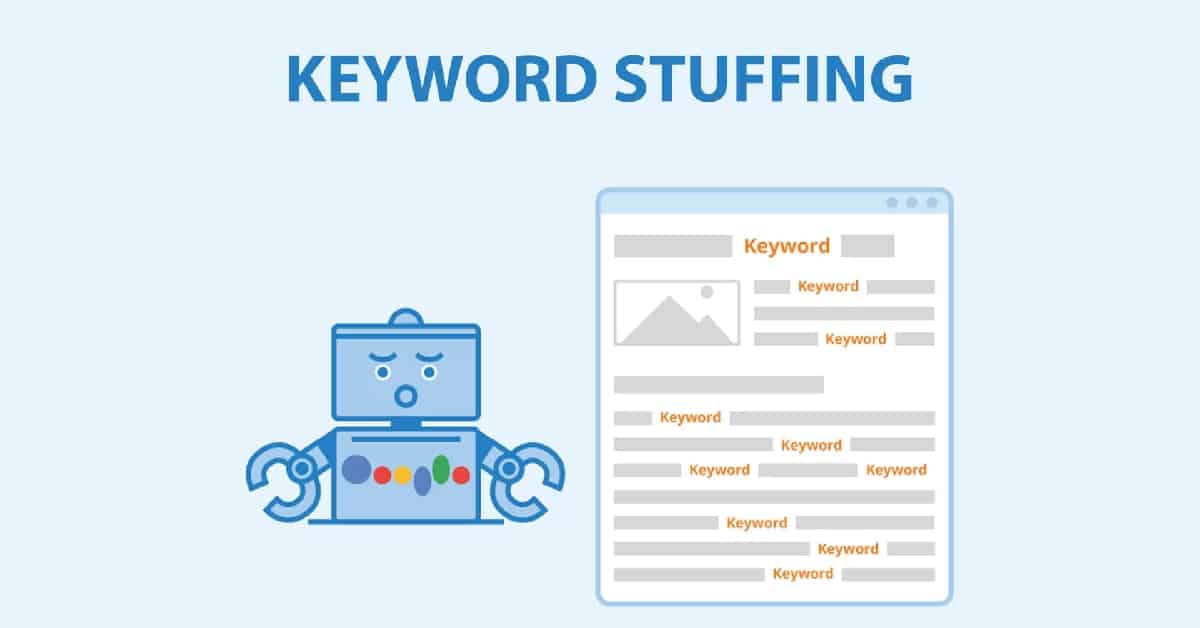Keyword stuffing is a tactic used by some website owners and marketers in an attempt to improve their search engine rankings. The idea is that by including a large number of keywords or keyword phrases on a page, the page will be more likely to show up in search results for those keywords. However, this tactic is often viewed as manipulative and unethical by search engines, and can lead to penalties or even being banned from search results altogether.
One of the main issues with keyword stuffing is that it can make the content on a page difficult to read and understand. When a page is packed with keywords, the text can become jumbled and hard to follow, which can lead to a poor user experience. Additionally, when a page is stuffed with keywords, it can be difficult for search engines to determine the main topic or purpose of the page, which can lead to a lower ranking in search results.
Search engines like Google have implemented algorithms that are designed to detect and penalize pages that engage in keyword stuffing. These algorithms use a variety of techniques to identify pages that have been stuffed with keywords, such as analyzing the density of keywords on a page, looking for patterns of repeated keywords, and analyzing the overall quality of the content. When a page is identified as engaging in keyword stuffing, it may be penalized by receiving a lower ranking in search results or even being removed from search results altogether.
- How to Use Keywords Properly?
When it comes to using keywords on your website, it’s important to remember that quality is more important than quantity. You should only use keywords where they are relevant and useful to your audience, and you should never stuff them into places where they don’t belong.
Here are a few tips for using keywords effectively:
1. Choose the right keywords.

Before you start incorporating keywords into your content, you need to choose the right ones. There are a number of factors to consider, including:
– What are people searching for?
To determine this, you can use a keyword research tool like Google AdWords Keyword Planner. This tool will show you the number of people who are searching for each keyword.
– How competitive is the keyword?
The Google AdWords Keyword Planner will also show you how competitive the keyword is. This is measured by the “Competition” column, which is shown as a number from 0 to 1. The higher the number, the more competitive the keyword is.
– What is your niche?
Your niche is the topic or industry your site is focused on. When choosing keywords, it’s important to focus on keywords that are relevant to your niche.
– What are your goals?
Your goals will dictate which keywords you target. For example, if you’re looking to generate traffic, you’ll want to target high-traffic keywords. If you’re looking to sell a product, you’ll want to target keywords that have a high commercial intent.
2- Use keywords in the right places
Once you’ve identified the right keywords, it’s important to use them in the right places on your website. The most important place to use keywords is in the title tag and header tags of your webpage. The title tag is the text that appears in the top bar of a web browser when a user visits a page, and it is also the text that appears in the search results for that page. Header tags, such as H1 and H2 tags, help to break up the content on a page and make it easier to read. They also help to indicate the structure of the content, which can make it easier for search engines to understand.
In addition to the title tag and header tags, keywords should also be included in the URL of the page, the meta description, and throughout the body of the content. The URL should be concise, relevant and contains the primary keyword. The meta description should be written to entice the users to click on the link and should also include the primary keyword. The body of the content should have a good balance of keywords that are used naturally and in a way that adds value to the content.
3- Use keywords naturally
It’s important to use keywords naturally in your content. This means that you should use them in a way that makes sense and flows well with the rest of the text. Stuffing keywords into your content in an unnatural way can actually harm your search engine rankings. Search engines are designed to detect keyword stuffing, and they will penalize you for it. By using keywords naturally, you’ll be able to create content that is both informative and easy to read.
One way to ensure that your keywords are being used naturally is to focus on creating high-quality, informative content. If your content is well-written and provides value to the reader, the keywords will naturally fit into the text. It’s also important to pay attention to the overall keyword density, which is the number of times a keyword appears in relation to the total number of words on the page. A keyword density of 2-3% is generally considered optimal, as it provides the right balance between keyword relevance and natural language.
4- Use long-tail keywords
Long-tail keywords are longer phrases that are more specific than short-tail keywords. They are typically used by people who are further along in the buying process and have a more specific idea of what they are looking for. For example, “best running shoes for flat feet” is a long-tail keyword, while “running shoes” is a short-tail keyword. Long-tail keywords can be more effective for driving traffic to your website, because they are more specific and are less competitive than short-tail keywords.
Long-tail keywords also help to increase the chances of your page appearing in the search results for a specific search query. For example, “best running shoes for flat feet” is more specific than “best running shoes” and therefore, it’s more likely to match the search query of someone who is looking for running shoes specifically for flat feet. Additionally, long-tail keywords are less competitive, meaning that there are fewer websites targeting those keywords, which can increase your chances of ranking higher in the search results.
5- Use LSI keywords
LSI (Latent Semantic Indexing) keywords are related keywords that help to provide context to your content. They help to indicate to search engines what the content is about, and they can also help to improve the readability of your content. By including LSI keywords in your content, you can help to increase the chances of your page appearing in the search results for a broader range of keywords.
Including LSI keywords in your content can also help to improve the overall quality and relevance of the content. LSI keywords help to show search engines that your content is truly relevant to the main keyword, and they also help to make the content more readable and engaging for the users. Additionally, by including LSI keywords in your meta tags, you can help to increase your chances of appearing in the “people also ask” section in the search results.
6- Use keywords in meta description

The meta description is a short summary of the content on a page that appears in the search results. It’s important to include keywords in the meta description, because it can help to increase the click-through rate of your page. When people see that the meta description contains keywords that are relevant to their search query, they are more likely to click on the link.
It’s important to note that the meta description should be written for the users, not for the search engines. While including keywords in the meta description is important, it’s also important to make sure that the meta description is engaging and entices the users to click on the link. Additionally, the meta description should not be more than 156 characters, as Google will truncate anything more than that in the search results.
Keyword stuffing is the act of filling a web page with keywords or numbers in an attempt to manipulate a site’s ranking in search engine results. Often, site owners will do this by placing the keywords throughout the page, in hidden text, or in the metatags. While this used to be an effective way to improve rankings, it is now considered spamming and can result in a site being penalized by the search engines.
To use keywords effectively, you should sprinkle them throughout your page naturally, using them in the text, titles, and metatags. You should also make sure that your keywords are relevant to your topic. If you use them too often, you will likely be penalized by the search engines, so use them sparingly.
Our related articles:
 Anas is our go-to copywriter with a knack for crafting persuasive and high-converting eCommerce landing pages. His passion for words and understanding of consumer psychology helps turn visitors into loyal customers. When he's not refining his copy, Anas enjoys exploring the latest digital marketing trends and experimenting with new writing techniques. His blend of creativity and strategic thinking makes him an indispensable part of our energetic team.
Anas is our go-to copywriter with a knack for crafting persuasive and high-converting eCommerce landing pages. His passion for words and understanding of consumer psychology helps turn visitors into loyal customers. When he's not refining his copy, Anas enjoys exploring the latest digital marketing trends and experimenting with new writing techniques. His blend of creativity and strategic thinking makes him an indispensable part of our energetic team.












